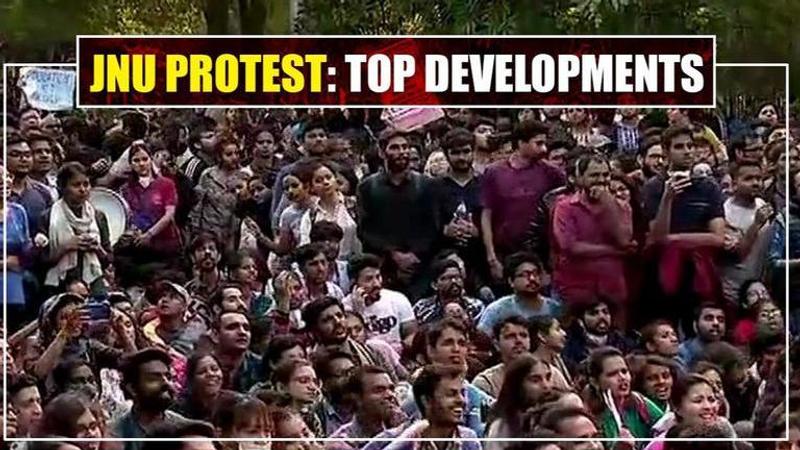Published 19:49 IST, November 18th 2019
JNU students' protest march to Parliament debilitates Delhi: Top developments
On Monday, a large group of protesting JNU students unsuccessfully tried to march towards Parliament demanding a complete rollback of the new hostel manual

The students of JNU have been protesting for the last few weeks about the new hostel manual which advocated a hike in hostel fees, dress code regulations, and curfew timings. While the JNU administration announced a partial rollback of some of the contentious provisions, the students expressed their dissatisfaction. In the morning, a large group of protesting students decided to march to Parliament demanding a complete rollback of the hostel manual.
Here are the top developments on the JNU student protest:
1. On Sunday, the JNU administration called upon the students to return to their classes and resume their academic work. In a circular, it observed, "Administration appeals to the JNU students to return to the classes and labs and resume their academic and research work so that the losses incurred already on these counts may be compensated.” However, the students did not pay heed to this appeal and continued their protests on Monday.
2. Section 144 of the Code of Criminal Procedure has been imposed on the JNU campus by the Delhi police. More than 1400 security personnel were deployed ahead of the students’ march to the Parliament. The Winter session of the Parliament commenced on Monday.
3. Speaking exclusively to Republic TV, Union Minister for Parliamentary Affairs Prahlad Joshi condemned the behaviour of some of the JNU students. He revealed that the Human Resource Development Minister was also treated with disrespect. Joshi said, “One of our HRD ministers who visited JNU was also treated with disrespect, this behaviour of the students is unacceptable.”
4. Meanwhile, the Ministry of Human Resource Development has set up a high-power committee to resolve the issues of the JNU students via dialogue. The notification issued by the Ministry of Human Resource Development says, “With a view to restoring the normal functioning of the Jawaharlal Nehru University through dialogue with all the stakeholders and to advise the university administration for resolution of contentious issues, Government has appointed a High Power Committee". The Committee was requested to initiate dialogue with the students and the university administration immediately and submit recommendations.
5. The JNU Teachers Association held the administration responsible for the 'disturbed atmosphere of the campus'. It slammed the JNU administration for not engaging in any dialogue with the students. The Association claimed that the hike in hostel charges was a step in destroying the character of JNU as a public institution. It also reminded the VC of the referendum signed by the Association asking him to step down from his post.
6. The students' protest found resonance in the Rajya Sabha. BSP MP Kunwar Danish Ali opined that the fee hike in the Central University was a way to stop poor students from availing education. He said, "Since the NDA has come to power, every institute is going under privatisation. They are now privatising Educational institutes too. JNU is an example. It is one institute where many poor come for education. This is condemnable. Poor students will have to leave their education. I urge you to look into this so that the poor students can complete their studies."
7. Senior Congress leader Ghulam Nabi Azad also backed the protests of the JNU students on Monday. Furthermore, he condemned the fee hike imposed by the university administration citing the economic status of the students studying in JNU. Moreover, he pinned the responsibility of the law and order problem on the authorities.
8. Entry and exit points of multiple Delhi Metro stations near Parliament were shut down temporarily due to the JNU student protest. Initially, it was announced that the trains would not halt at Udyog Bhawan, Patel Chowk, Jorbagh along with the closure of the entry and exit gates. Later, this restriction was extended to the Lok Kalyan Marg station as well.
9. While the students alleged use of excessive force, Delhi Police PRO Mandeep Randhawa stated that the allegations would be investigated. He said that attempts were being made to engage with the students regarding their demands and to convince them against taking the law in their own hands.
10. Some of the agitating students were stopped and contained in the Safdarjung Tomb area. It was also revealed that around 100 students had been detained for showing ‘'aggressive defiance” to the directions of the police. In the evening, the police forcibly removed the JNU student protesters, who had brought civic life and traffic to a standstill, with an ambulance being among the many vehicles forcibly held up.
Updated 21:24 IST, November 18th 2019




